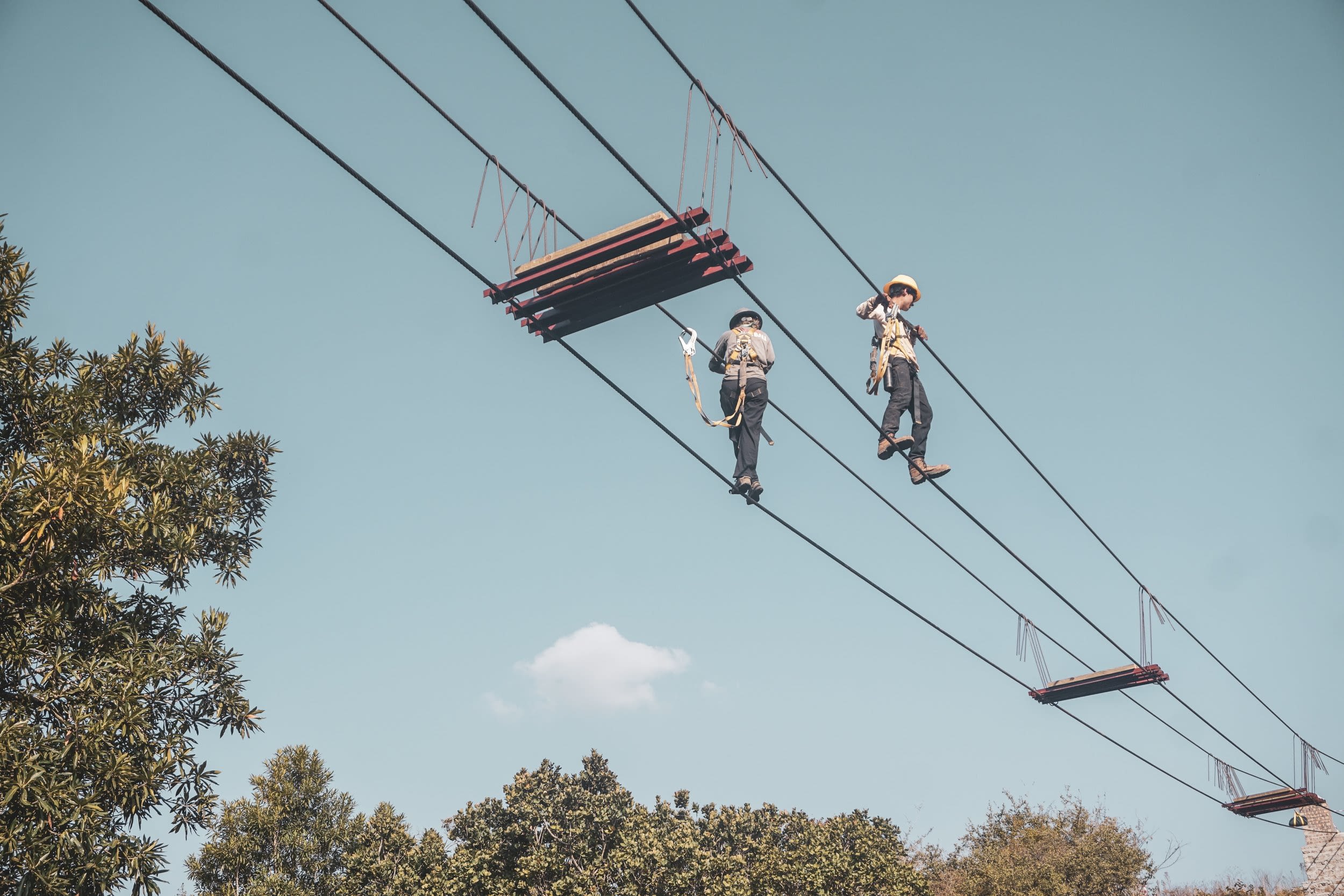Situated between Nova Scotia and New Brunswick, the Bay of Fundy had fascinated my husband and I many years ago when we were passing through the area on our way home from Prince Edward Island. Now on a vacation to Nova Scotia, Canada, we decided to visit Burntcoat Head National Park to see the Bay once again—this time from the other side. More than a place to witness the dramatic contrast between low tide and high tide, Burncoat Head offers visitors a unique opportunity to explore the exposed ocean floor during low tide.
As we walked from the visitor’s center to the viewing area, we passed sign after sign warning of the dangers of the rapidly changing tide and the need to leave the area well before the onset of high tide. Taking the stairs from the grassy knoll to the designated access point, we stepped out onto the spacious rock ledge.
The view was spectacular.
A rugged outcropping of trees stood rooted in a mass of exposed ground—somewhere around fifty feet high—while all around it stretched a vast ocean floor of embedded rock and mud. Oddly out of place, and yet fittingly so, the land formation seemed to defy the ebb and flow of the Bay’s tidal flow. Etched along the exposed sides of the land mass were the markings of time and pressure from the water’s flow.
But it wasn’t the only thing bearing the scars.
Looking back up toward the coastline of land we’d descended, I noticed the same eroded features—and a tall evergreen tree leaning out over the ocean floor at an almost ninety-degree angle. Suspended, half of its roots were solidly embedded in the land while the other half hung loosely down the eroded cliff.
Loss.
It does that to us. Leaves us half hanging. We look around us, and while some things appear unchanged, others are unrecognizable. Much feels unstable. Perhaps even everything.
Navigating Change
Life is funny sometimes, especially in the way we interchange words for both the significant and the superficial.
I love my kids.
I love a quiet day.
I love coffee.
I lost my keys.
I lost my dad.
And yet, from the superficial to the significant, loss means change—and change often brings disorientation.
Years ago, my husband was serving as the youth pastor of our church. In order to help the teens raise money for their annual retreat, we decided to sell Valentine’s candy baskets, complete with cellophane wrapping and ribbon. Hour after hour, we, along with some of the teens, assembled basket after basket.
Not long after, I noticed my keys were missing.
I turned the house, my car, my bags, junk drawers, and my backpack upside down. They were nowhere to be found. Since the baskets had already been delivered, I thought perhaps I’d wrapped my keys in one of them. I kept hoping someone would show up at the church with them in hand, wondering why a set of keys had been included with their gift. No such luck.
As trivial a loss as it was, it took me weeks to adjust. It was a simple set of keys, but they held the rhythms of my everyday life. Car keys and various door keys, they were for the most part replaceable. Except the car fob. But even after I had a new set of keys, it still didn’t feel the same.
It never does.
Eventually, we learn a new pattern of rhythms. We find new norms. But doing so takes time. It’s like looking at a map where the road names have changed and the roadside markers look different. We find our way forward, one step at a time.
In the midst of it all, we’re reminded just how human we are.
And in this place of recognizing our frailty, while it is important to let go, it is also important to stay rooted.
Staying Rooted
Like that tree precariously clinging to what little earth remains on an eroded cliff, we feel exposed. Alone. Abandoned.
The loss of a job. The loss of a relationship. The loss of a loved one. The loss of financial stability. The loss of a dream.
Any one of these can make us feel like the sod that held us fast has been forced away by a dangerously high tide. Like Martha, we look at Jesus, and even if we don’t say it aloud, we hear deep in our hearts: “Lord, if only you had been here” (John 11:21, NLT). If only You had shown up. If only You had come through for my family. If only You had answered my prayer.
If only You.
It’s not just our physical routines or our way of life that loss disrupts. Sometimes, it scars our hearts and minds. We don’t just grieve—we wait, wondering what we will lose next. Our thoughts become a battleground, littered with why’s.
Loss reminds us just how much we are not in control. And that terrifies us. Only when we’re honest—about being afraid, about wanting to be in control, about our deep-seated longing for Jesus to explain why—can we understand what it means to be rooted in someone greater than ourselves.
In in these times and places of loss, we must remember the enemy’s goal: a loss of love.
Writing to the Ephesians, Paul pointed them to a purpose far beyond what they could see. Lovingly, he reminded them not to become sidetracked with the losses he had endured. He prayed for them, asking God to show them just how much He loves them. He prayed for the Holy Spirit to give them strength (Ephesians 3:14, 16). He continued:
Then Christ will make his home in your hearts as you trust in him. Your roots will grow down into God’s love and keep you strong. And may you have the power to understand, as all God’s people should, how wide, how long, how high, and how deep his love is. May you experience the love of Christ, though it is too great to understand fully. Then you will be made complete with all the fullness of life and power that comes from God. (Ephesians 3:17–19, NLT, emphasis mine).
Loss reminds us that love and trust are not always the same. But in their most powerful expressions, they are inseparable. To love God is to trust Him. But greater still, it is to believe He loves us. And that, beloved, is why we can trust Him.
Especially when we don’t understand what life has delivered to our doorstep.
Finding Peace
Loss offers few easy answers—nor should it. Making peace with loss doesn’t mean an absence of questions or a lack of grief. Neither is it circumstantial capitulation, a “whatever” shrug of the shoulders that belies the value of what we no longer have. God does not ask us to create a reality that doesn’t exist. Loss impacts. Loss matters.
But making peace does mean recognizing God’s presence in our loss. It is taking what we held dear and offering what has remained in its absence—our pain, our uncertainty, our confusion, our anger, our grief—in surrender to Christ. Not because we understand why. Not because we believe something greater will happen in its place. Not because we cower in submission to a distant God.
We surrender in love.
Convinced by His love, we learn to trust His goodness (John 15:13)—in loss as well as in abundance. Then, and only then, can His peace rest on our lives (John 14:27).
—Written by Regina Franklin. Used by permission from the author.







One Response
Thanks for the words of encouragement. I’ve had many losses in my life. And I know from experience that God is more than enough. We must love, trust and be obedient to His word. Again thank you.